
Schor’s question at the time was “Will a new feminist literary criticism arise that will take literariness seriously while maintaining its vital ideological edge?” The contributors take literariness—the “bad object” of this issue—seriously. They do not necessarily engage in debates about reading, theorize new formalisms, or thematize language; rather, they invigorate and unsettle the reading experience, investigating the relationship between language and meaning.
Contributors. Lee Edelman, Frances Ferguson, Peggy Kamuf, Ramsey McGlazer, Thangam Ravindranathan, Denise Riley, Ellen Rooney, Elizabeth Weed
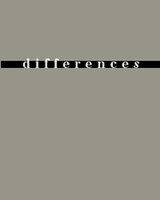
In bringing together major feminist critics whose work has been touched by the writings of Derrida, this issue both pays tribute to and reflects upon Derrida’s ideas. Among the essayists included, Jane Gallop considers Derrida’s writings on Levinas; Judith Butler reads Derrida’s final interview in Le Monde in 2004; Elizabeth Grosz signals Derrida as a rare philosopher for whom sexual difference was crucial; Gayatri Chakravorty Spivak explores the figure of the mother’s child in Derrida, focusing on the critique of reproductive heteronormativity and the question of agency in feminism; and Joan Wallach Scott argues for the importance of critique in the academy. The issue also includes an edited transcription of a vibrant discussion between feminist theorists and Derrida called “Women in the Beehive: A Seminar with Jacques Derrida,” which took place at Brown University’s Pembroke Center for Teaching and Research on Women in 1984.
Contributors. Fran Bartkowski, Anne-Emmanuelle Berger, Susan Bernstein, Judith Butler, Pheng Cheah, Drucilla Cornell, Jane Gallop, Elizabeth Grosz, Peggy Kamuf, Christie McDonald, Joan Wallach Scott, Gayatri Chakravorty Spivak

Most readers of Louis Althusser first enter his work through his writings on ideology. In an important new essay Étienne Balibar, friend and colleague of Althusser, offers an original reading of Althusser’s idea of ideology, drawing on both recently published posthumous writing and Althusser's work on the Piccolo Teatro di Milano. Balibar’s essay uncovers the intricate workings of interpellation through Althusser’s essays on the theater. If debates on dialectical materialism belong to a distant history, Balibar suggests, the question of ideology remains crucial for thinking the present.
The issue includes commentaries on Balibar’s essay from five influential scholars who engage critically with Althusser’s philosophy: Judith Butler, Banu Bargu, Adi Ophir, Warren Montag, and Bruce Robbins. This issue reanimates Althusser’s concept of ideology as an analytic tool for contemporary cultural and political critique.
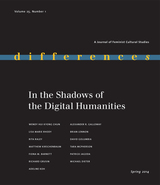
Contributors: Fiona M. Barnett, Wendy Hui Kyong Chun, Michael Dieter, Alexander R. Galloway, David Golumbia, Richard Grusin, Patrick Jagoda, Matthew Kirschenbaum, Adeline Koh, Brian Lennon, Tara McPherson, Rita Raley, Lisa Marie Rhody
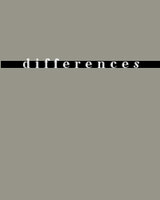
The contributors to Man and Beast, writing from an array of academic disciplines, collectively rethink human relationships with other animals. Pointing to the ethical implications of taxonomic classifications and distinctions drawn by the natural sciences, one essay argues that these categories are neither as abstract nor as neutral as commonly assumed. Another essay offers a historicizing study of species barriers to examine the way in which zoological classifications have been breached, relegating some humans to the category of “animal” or, alternately, including in the human circle nonhuman species. Other essays consider the attribution of a human speech impediment to such famous talking cartoon animals as Porky Pig, read the social implications of such popular animal-human hybrids as “Bat Boy” of the tabloid press, and examine the representation of animals as moral agents in fables dating to Aesop, noting the appearance of such tales during periods of social upheaval and instability. All of these suggest that the category of “beast,” like that of human being, has never been either homogeneous or stable.
Contributors. Howard Bloch, Judith L. Goldstein, Harriet Ritvo, Marc Shell, Barbara Herrnstein Smith
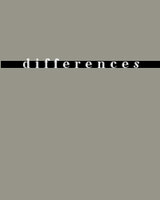
Contributors. Athena Athanasiou, Etienne Balibar, Mara de Gennaro, Carolyn J. Dean, Brady Thomas Heiner, Lynne Joyrich, Jacques Lezra
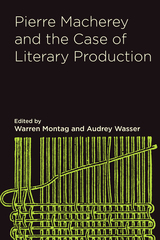
This collection revisits A Theory of Literary Production (1966) to show how Pierre Macherey’s remarkable—and still provocative—early work can contribute to contemporary discussions about the act of reading and the politics of formal analysis. Across a series of historically and philosophically contextualized readings, the volume’s contributors interrogate Macherey’s work on a range of pressing issues, including the development of a theory of reading and criticism, the relationship between the spoken and the unspoken, the labor of poetic determination and of literature’s resistance to ideological context, the literary relevance of a Spinozist materialism, the process of racial subjectification and the ontology of Blackness, and a theorization of the textual surface. Pierre Macherey and the Case of Literary Production also includes three new texts by Macherey, presented here in English for the first time: his postface to the revised French edition of A Theory of Literary Production; “Reading Althusser,” in which Macherey analyzes the concept of symptomatic reading; and a comprehensive interview in which Macherey reflects on the historical conditions of his early work, the long arc of his career at the intersection of philosophy and literature, and the ongoing importance of Louis Althusser’s thought.
Recent translations of Macherey’s work into English have introduced new readers to the critic’s enduring power and originality. Timely in its questions and teeming with fresh insights, Pierre Macherey and the Case of Literary Production demonstrates the depths to which his work resonates, now more than ever.
READERS
Browse our collection.
PUBLISHERS
See BiblioVault's publisher services.
STUDENT SERVICES
Files for college accessibility offices.
UChicago Accessibility Resources
home | accessibility | search | about | contact us
BiblioVault ® 2001 - 2024
The University of Chicago Press









